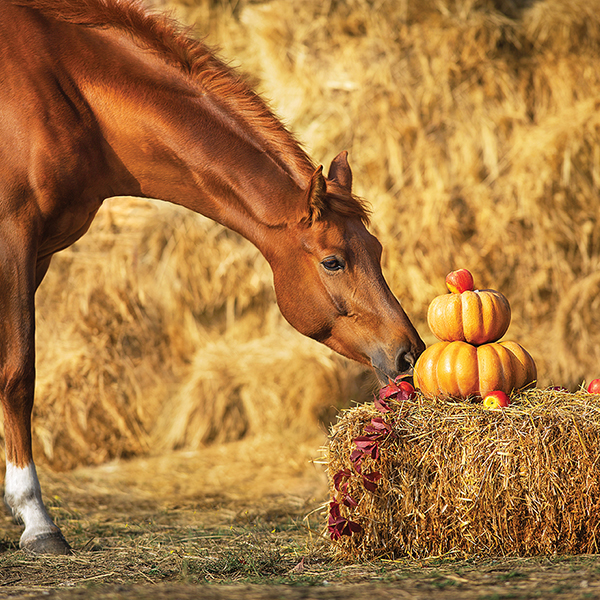With the arrival of fall comes a delightful abundance of pumpkins. From pumpkin pies to pumpkin spice lattes, these seasonal delights are hard to resist, and pumpkins are a fun way to decorate the barn. But while we humans indulge, what about our equine friends? Can pumpkins be a part of horses' diet too? Absolutely, but with caution and care.
Pumpkins are rich in Vitamin A, vital for vision and immune function, and contain trace amounts of Vitamins C, E, and several B vitamins. Pumpkins also offer a good dose of potassium, essential for maintaining fluid balance and nerve function.
Safe for Horses with Metabolic Concerns
Unlike many sugary treats, pumpkins have a low glycemic load, making them safe for horses with Equine Metabolic Syndrome (EMS). This means they won’t drastically spike blood glucose levels, keeping your horse’s metabolism stable.
Potassium Considerations
However, for horses suffering from Hyperkalemic Periodic Paralysis (HYPP), caution is advised. Such horses require a diet low in potassium, so it’s best to avoid feeding them pumpkins.
What is HYPP? Hyperkalemic Periodic Paralysis (HYPP) is a genetic disorder that affects certain horse breeds, primarily the American Quarter Horse, causing episodes of muscle weakness or paralysis. This condition is triggered by abnormal fluctuations in potassium levels in the bloodstream, leading to muscle cell excitability and, consequently, muscle spasms. Horses with HYPP may exhibit symptoms such as trembling, weakness, or difficulty moving, especially after a diet rich in potassium. Management of this condition typically involves dietary restrictions to minimize potassium intake and regular monitoring by a veterinarian to ensure the horse remains healthy and free from paralysis episodes. Understanding the implications of HYPP is crucial for horse owners, particularly when considering treats like pumpkins that impact potassium levels.
How to Safely Feed Pumpkins to Horses
While pumpkins can be a healthy treat, it’s crucial to feed them correctly to avoid digestive issues or choking hazards.
Whole Pumpkins
Whole pumpkins may look fun and engaging for horses to nibble on, but feeding them in their entirety can shock a horse’s digestive system. Instead, cut the pumpkin into small pieces. This makes it easier for horses to chew and digest. Some owners can even cook the pumpkin into a mash so it is easier for horses with dental issues to eat. A good rule of thumb is to limit treats to one or two slices per day or up to a cup.
Pumpkin Seeds
Though pumpkin seeds are beneficial for humans, their effects on horses remain largely unknown. Until more research provides clarity, it’s advisable to avoid feeding pumpkin seeds to your horse.
Pumpkin DON’Ts
When incorporating pumpkins into your horse’s diet, there are several important precautions to keep in mind:
Avoid Pumpkin Decorations: Do not feed pumpkins that have been painted, carved, or contain candle wax.
Check for Freshness: Ensure the pumpkin is fresh. Moldy or soft pumpkins can be harmful.
Remove Stalks: The pumpkin stalk can be a choking hazard, so make sure to remove it before feeding.
No Gourds: Gourds, while similar in appearance to pumpkins, are not safe for equine consumption. Gourds pose several risks to horses, primarily due to their toxicity and difficult digestibility. Certain varieties contain compounds that can be harmful, leading to gastrointestinal distress or even poisoning. Additionally, their tough texture makes them hard for horses to chew and digest, which can result in choking or colic. For these reasons, it is essential to steer clear of feeding gourds to horses and stick to safer options like pumpkins.
Consult the Experts
If you’re uncertain about feeding pumpkins to your horse, consult your veterinarian, equine nutritionist or local extension office.
Pumpkins can indeed be a delightful and nutritious addition to your horse’s diet when fed in moderation and with care. They bring a touch of autumn joy to your barn while complementing your horse’s nutritional needs. Always prioritize your horse’s health and consult with experts when introducing new elements into their diet.
For more information on equine nutrition and care, reach out to local extension agencies such as the UT TSU Shelby County Extension, ensuring you are equipped with the best knowledge for your equine companions.
Kyla Szemplinski, MS, is an Extension Agent I and 4-H Agricenter Youth Development for UT TSU Shelby County Extension. She serves Shelby County, Tennessee equine community, and can be contacted at the Shelby County office at 901-752-1207 during normal business hours Monday-Friday 8am-4:30pm CST.








